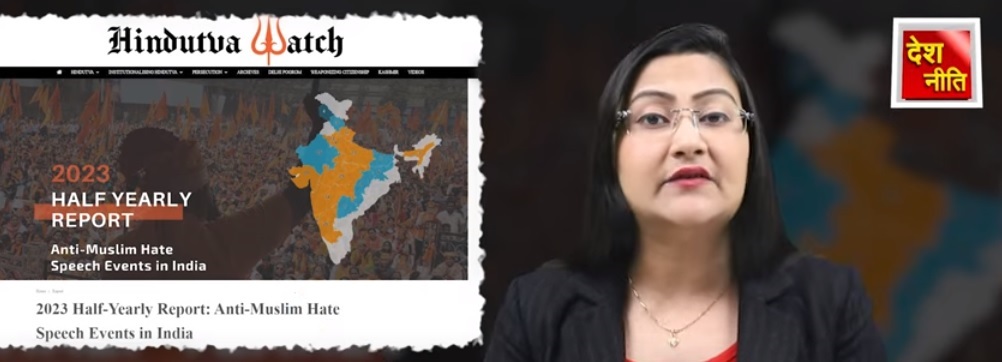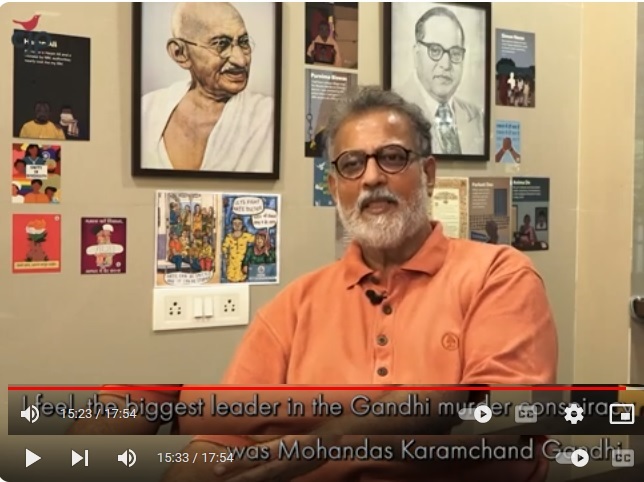मोदी-BJP सरकार पर बड़ा खुलासा, Hindustv watch report on Modi - BJP govt https://www.youtube.com/watch?v=gJpo0MB5L54 DESH NEETI 2nd Oct. 2023
Modi’s BJP linked with most hate speech in India: Report https://www.deccanherald.com/india/modis-bjp-linked-with-most-hate-speech-in-india-report-2700882 Some 80 per cent of the 255 documented incidents of “hate speech gatherings targeting Muslims” occurred in Bharatiya Janata Party-ruled states and union territories, according to a report from ...
Some 80 per cent of the 255 documented incidents of “hate speech gatherings targeting Muslims” occurred in Bharatiya Janata Party-ruled states and union territories, according to a report from Hindutva Watch. The Washington DC-based research group tracks hate crimes and inflammatory speech against Muslims and other minorities in India.
Though India doesn’t have an official definition for hate speech, the research group used language from the United Nations, which characterizes hate speech as “any form” of communication that employs “prejudiced or discriminatory language towards an ...
2023 Half-Yearly Report: Anti-Muslim Hate Speech Events in India https://hindutvawatch.org/hate-speech-events-india/
SEPTEMBER 24, 2023 https://hindutvawatch.org/hate-speech-events-india/ Throughout the first half of 2023, India witnessed several instances where hate speech events, coupled with hate crimes, exacerbated the insecurity of its religious minorities. On March 30, on the occasion of the Hindu holiday of Ram Navami, Hindu far-right leader Kajal Shingla alias Kajal Hindustani made hateful remarks about Muslim women, helping ignite a riot in the western state of Gujarat. On the same day, in the eastern Indian state of Bihar, a procession filled with provocative and hateful slogans resulted in violence in the town of Biharsharif, leaving one dead and several injured. In June, rampant and repeated instances of hate speech events in Kolhapur, Maharashtra, culminated in clashes in the western state, while a month-long campaign in the northern state of Uttarakhand centered on the Hindu far-right conspiracy theories of “Love Jihad,” “Vyapar Jihad” and “Land Jihad,” resulted in the displacement of Muslims from several parts of the state. Muslim shops and homes were marked with a black ‘X’ symbol in an apparent attempt to intimidate the marginalized community.
Around 52% of hate speech gatherings in BJP-ruled states and union territories were orchestrated by entities affiliated with the Rashtriya Swayamsevak Sangh (RSS), including the Vishwa Hindu Parishad (VHP), the Bajrang Dal, the Sakal Hindu Samaj, and the Bharatiya Janata Party. Overall, 42% of all hate speech gatherings in 17 states which includes two centrally controlled territories were organized by groups affiliated with the RSS.
Breathing life into the dying rivers of Pune! https://www.indiawaterportal.org/articles/breathing-life-dying-rivers-pune Aarti Kelkar Khambete 25 Jan 2021 Jeevitnadi continues with its mission to breathe life into Pune’s rivers and has been awarded the prestigious Bhagirath Prayas Samman 2020 this year! Last two years have been witnessing heavy rains and extensive flooding of the city. One must remember that Pune is flood prone city! We have five rivers and more than six watersheds, each having a peculiar character. For example, the river Mutha originates and flows down from a steep mountain that has very less vegetation. The erosion is thus very high leading to deposition of a load of sediments that get carried along with the water into the low lying areas that get flooded.
There are a number of settlements in the pediment zone and runoff is very high and flows with a tremendous velocity carrying a lot of silt along with it when there are heavy rains.
Many constructions have been given permission in flood lines even after they were drawn and the width of the river is very narrow. To make it worse, there are large developmental projects like Metro and ring roads in the river bed. The bridges on rivers get constructed without any thought of minimising the environmental stresses on rivers and without using better and alternate designs. Urban rivers have so far been looked at differently. The focus always has been on harnessing urban rivers and their spaces for gains without consideration for the health and well being of the river. We wish to change this perception and help rivers be naturally flowing, clean and safe for generations to come!
Experts Warn Of Flooding in Pune Amid Prolonged Severe Weather https://www.mypunepulse.com/experts-warn-of-flooding-in-pune-amid-prolonged-severe-weather/
Punepulse September 27, 2023 Shailaja Deshpande, Founder, Jeevitnadi, Pune said, “The shape of Pune city is like a saucer. The bottom source of any type of water body is the river as water from any stream, nala etc. eventually enters a river. If projects like Riverfront Development etc., where, because of the walls built near rivers that block the channels of water to flow out, continue, then levels of river water will increase. As a result, the increased water levels will not have a medium to flow out and will enter the city flooding the entire city.”
By insisting on non-violence, Bapu extinguished the raging fire of communal violence in many parts of India but he himself fell victim to the bullets of an assassin. But how did it affect India for the next fifty years?
बापू के आख़री कुछ साल | Mahatma Gandhi’s last years | तुषार गांधी https://www.youtube.com/watch?v=MJGcXsochYQ Citizens for Justice and Peace Oct 1, 2023
The last four years of his life proved to be the toughest test of Mahatma Gandhi's principle of non-violence. From Direct Action Day to Partition, when the whole of India was burning in the fire of national hatred and violence, and the leaders of Congress and Muslim League were baking their bread, Bapu alone, risking his life, traveled from  Delhi to Noakhali, Bihar. From Calcutta to Calcutta, he kept fighting for the unity of India, taking support of the stick of non-violence. History is witness to the fact that through this effort he was successful in maintaining peace in the eastern parts of the country, but he had to fall victim to Nathuram Godse's bullet. In his books and also in this interview, Bapu's great-grandson Tushar Gandhi says about his last years that because of this valiant effort, especially as a result of his martyrdom, the wind of national hatred blew in this country for about fifty years, if at all it did not last. Didn't get it.
Delhi to Noakhali, Bihar. From Calcutta to Calcutta, he kept fighting for the unity of India, taking support of the stick of non-violence. History is witness to the fact that through this effort he was successful in maintaining peace in the eastern parts of the country, but he had to fall victim to Nathuram Godse's bullet. In his books and also in this interview, Bapu's great-grandson Tushar Gandhi says about his last years that because of this valiant effort, especially as a result of his martyrdom, the wind of national hatred blew in this country for about fifty years, if at all it did not last. Didn't get it.
Because times are changing now, and a new era of violence seems to be beginning, it has become necessary to remember those last few years of Bapu.
Citizens for Justice and Peace has been working for national unity in India for the last thirty years. We are Gandhiji's followers in this fight. This special video series with Tushar Gandhi is just an attempt to convey Gandhiji's thoughts to the public in the era of fake news and violence.
 https://youtu.be/tXFQ0fx6PL0 On the Investigation- Discussion on Screening of Who killed Gandhi -
https://youtu.be/tXFQ0fx6PL0 On the Investigation- Discussion on Screening of Who killed Gandhi -
https://youtu.be/0uUwmjdxMcc On the Historical Context-
https://youtu.be/4NI5flM76Xc Why no public Screening of the Film Who killed Gandhi in India
https://youtu.be/A35gQbrGhf8 On the Hindutva Narrative
Q & A after a recent screening of the film..https://www.youtube.com/watch?v=GB4i1G6OgYE
- only about 20% is forest area and efforts should be made to expand it to at least 33%
- Multiversity -- Some Documents
- Why Modi govt did not condemn Bidhuri & Pragya for their remarks, & the Khalistan issue
- The Global Risks Report 2023 18th Edition
- Swami Vivekananda Speech in Chicago America- S Bajpai
